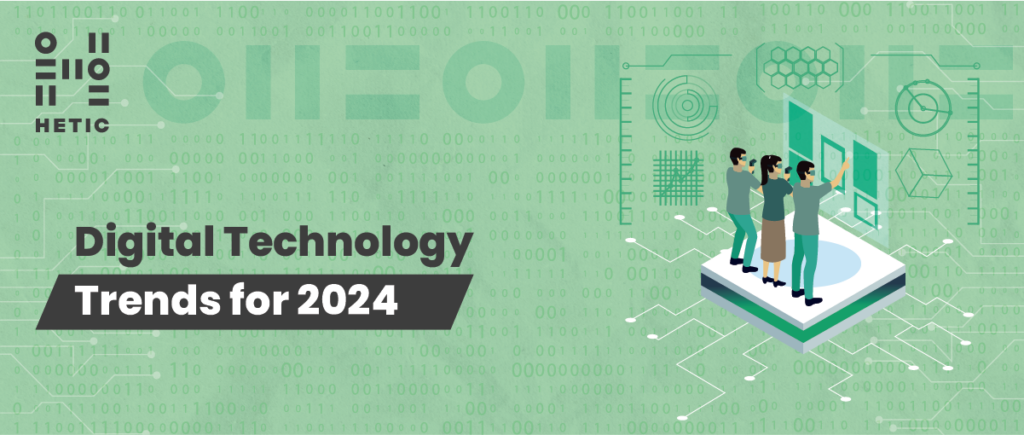
Our organizational structures today are defined by the digital tools we utilize to manage our business operations. As automation in systems becomes a general practice, investing in the right digital solutions has become imperative. Businesses are investing in digital tools to maintain a pulse on market innovations and give their products a competitive edge.
Each year, businesses lead strategic conversations on breakthrough technologies. This helps them to understand what needs immediate implementation in their operations. In the dynamic technology landscape, digital technology tools have proven to give businesses transformational shifts propelling them towards leading innovations. It enhances their ability to interact internally and externally. Building capacities that were far beyond reach.
What Shapes Digital Technology Trends?
In a business context, looking ahead isn’t simply about the latest technological advancement, it’s also about understanding global socio-political news, carbon footprint, policies and laws, ethical considerations, and changing consumer demands. These factors play a catalytically role in shaping the digital technology trends for 2024. The trends are shaped by a mixture of aspects that include:
– Rapid technology advancements
– Global connectivity and cultural engagement
– Rise of digital developments in the world of the metaverse, web 3.0, and 5G
– Rising consumer awareness and changing demands
– Alarming concern for climate change and carbon emissions
– Push toward a sustainable and circular economy setup, and
– Political environment shaping new laws and policy frameworks for businesses.
Top 5 Trends to watch out for in 2024
Here are a few rising trends in digital technology for 2024 impacting business operations:
a. Sustainable/Green Technology
As laws become more prominent for businesses to take responsibility for carbon emissions, organizations globally are trying actively to meet net-zero emissions. 2024 will see high growth in sustainable/ green technology adoption and innovations. The ESG sector is fast developing, and designing core tools and strategies to help businesses mitigate environmental concerns and carbonization. Businesses will seek out green alternative solutions like clean energy solutions, circular business practices, green cloud computing, and more.
Impacting:
i. supply chain management to reduce carbon emissions,
ii. transportation solutions like the use of electric cars,
iii. urban city development plans, and more.
It will involve building infrastructure like sustainable apps – that help users to live an eco-friendlier lifestyle.
Example: Tesla, the global innovation brand in electric cars claims that their electric cars generate roughly net zero emissions.
b. Generative AI
Making global news in 2023 for its widespread mainstream use, Generative AI is here to stay and take over business operations by storm in 2024. A powerful tool in AI, Generative AI extends to office software, design software, marketing tools, communication tools, and more. It has the capabilities of a super-smart personal assistant that works 24/7. Giving fast and efficient solutions. The use of this tool allows businesses to create new content with ease. It can help you generate images, text, audio, and other forms of content alongside making basic predictions. It has the capabilities of:
I. Image generation: Creating strikingly realistic images that resemble your looks. Or an artwork, design, or photograph.
II. Text generation: Creating defined written content with apt headings, paragraphs, and details.
III. Speech Synthesis: Generating a natural-sounding voice audio.
Example: The global software giant NVIDIA is using Generative AI called NVIDIA’s StyleGAN to produce high-quality realistic images. Generating faces, artwork, and deepfake videos.
c. Intelligent process automation (IPA)
Another key trend for 2024 in Artificial Intelligence is IPA. It is the combination of rules-based automation (RPA) and AI technologies like Natural Language Processing, Machine Learning, etc. Helping businesses to automate complex business decisions.
What does IPA do?
It’s an automation process where the user information is captured electronically from stored documents and automated communication with a customer is initiated. A very basic use case is automated welcome emails or messages.
Example: Brand Salesforce uses IPA in its cloud-based CRM for its Einstein AI platform to help the brand automate sales processes. HypersSense Software highlights in an article that Salesforce uses Einstein AI to analyze customer data and generate insights to fast-track the deal closure. The brands that make use of Salesforce Einstein AI solutions have quoted to HyperSense Software that they witnessed a 26% increase in win rates, highlighting how potent IPA use can be.
d. Extended reality (ER)
ER is essentially the mix of all immersive technologies that simulate reality. Inclusive of Virtual reality (VR), mixed reality (MR), and augmented reality (AR). There is significant growth of ER in many aspects of business operations, especially in connection with Metaverse, digital marketing, and e-event marketing possibilities. Pushing the boundaries of the real world into the virtual, ER is widely popular in gaming, retail expansion, modelling, and the healthcare sector.
Example: ER has become a popular choice of surgical practice in the medical profession. Surgical training using VR allows surgeons to practice surgery in a real-time environment before operating on real patients. This helps to enhance their skills, offer them real-time consequences of surgical mistakes, and hone their skills to enhance patient safety.
e. Datafication
Data collection and analysis have been around for a long time; however, digital technology advancements have changed how businesses utilize this data. With the increased use of smart devices, IoT has become a vastly utilized resource for businesses. Offering them more practical data information to build hyper-personalized ads, targeting the specific needs of the users. All are based on data collection, monitoring, and analysis to make informed decisions. Datafication allows businesses to effectively transform many aspects of their business operations:
i. Hyper-personalization: Businesses can build personalized ads, products, and marketing campaigns to entice and close customers.
ii. Predictive analysis: Using AI, IPA, and ML to predict trends, market performance, sales, consumer behaviour patterns, etc.
iii. Product development: Making the best use of data-driven insights to design new product lines based on market expectations and demands.
iv. Efficiency in operations: Data helps businesses streamline workforce performance, enhance operational efficiency, and analyze repetitive tasks. Identifying bottlenecks to optimize workflow.
Intelligent applications, 3D printing, Cybersecurity, 5G, Digital Trust, Edge computing, etc are some other rising digital technologies to build on in 2024. These technologies are transforming education, healthcare, finance, retail, supply chain, real estate and more. Businesses are capitalizing on these to optimize processes, improve data-driven decision-making, and enhance efficiency in operations. As the adoption of these digital technologies tools rises, there is also an increase in demand for skilled professionals to manage them.
Join Hetic’s MBA in Digital Business to lead a successful global career in the dynamic digital business world. The programme offers you a trifecta learning of digital business management with the amalgamation of industry projects, French pedagogy, and up to 20% international faculty. Working with peers on projects to enhance your soft skills and leadership management abilities.
Reach us here to learn more about the programme.
Admissions are open
You can download the application form with this form

